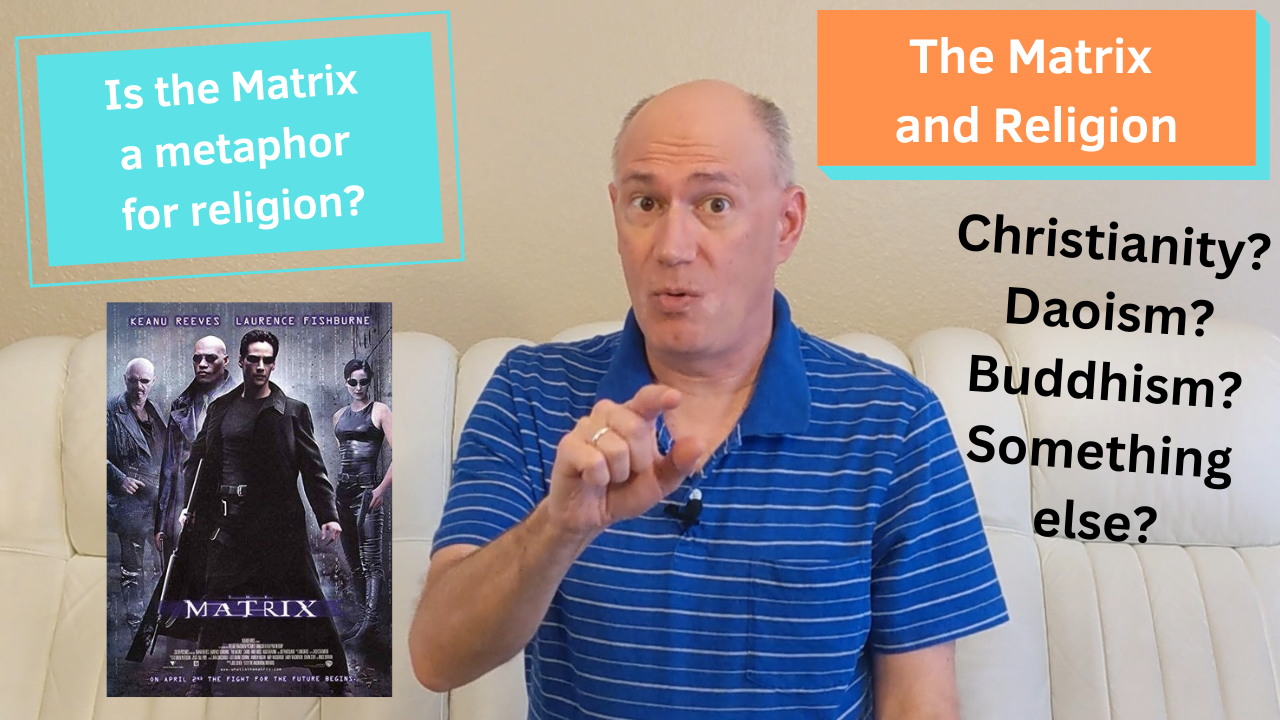03/01/2023 – The Matrix and Religion

What is the Matrix? Is the first Matrix film a metaphor for a particular religion? If so, which religious tradition best represents what the Matrix is depicting? We’re going to get into this and a whole lot more. Stick around. This is TenOnReligion.
Hey peeps, it’s Dr. B. with TenOnReligion. If you like religion and philosophy content one thing I really need you to do is to smash that sub button because it really helps out the channel. The transcript is available at TenOnReligion.com and new episodes are posted about every two weeks, at noon, U.S. Pacific time, so drop me some views.
In 1999, the movie The Matrix was released and it featured a rather intricate dystopian science fiction plot with what was at the time cutting edge technology. Even though it developed into a franchise with two sequels in 2003 plus a plus a fourth installment in 2021, I’m only going to be talking about the original film today. The later films were only written after the first film became popular and I’m not entirely convinced their plot lines were part of the original story, so we’re just sticking to the first film today. I’m sure you’ve all seen the film or else you wouldn’t be watching this video. A computer programmer named Thomas Anderson also goes by the online alias of Neo. He is found and brought to a man named Morpheus who offers him a choice of either taking a red pill to reveal what the Matrix really is, or a blue pill which will cause him to go back to his regular life. He takes the red pill which helps Morpheus and his crew locate Neo in real time and extract him from the Matrix.
Neo recuperates from being in an enormous futuristic-looking farm of pods which intelligent machines created to harvest bioelectric power from humans after humans intentionally darkened the sky to shut down the machines’ access to solar energy. Neo is supposed to be the “one” who is prophesied to free humans from the machines. Morpheus and crew have the technological ability to enter the Matrix, shown as a late 1990’s simulated three-dimensional environment. The intelligent machines also have the ability to enter and take over the personage of any individual connected to the Matrix and are shown on screen with men in dark suits and dark sunglasses and are known as Agents, with the main character as Agent Smith. There’s an insider to Morpheus’ crew that sells out to the Matrix, and betrays them. Morpheus is abducted and subsequently rescued by Neo, however in doing so, Neo gets stuck in the Matrix. Agent Smith kills Neo, but he revives with new abilities to understand and manipulate the Matrix such that he is able to defeat Agent Smith.
This movie immediately became known for its depiction of martial arts, and especially its visual effects with the invention and debut of “bullet time,” basically time-slice scenes with a temporal element of slow-motion frames, for which it won an Academy Award. Years ago, I used this film in a humanities course in part to discuss postmodern themes such as pluralism and the colliding of styles, hyperreality or created realities, and/or differing perceptions of reality. We also discussed that one of the main postmodern themes in the movie is the total replacement of humanity with technology. Is the continual expanding of technological applications in our society a negative or a positive thing? These were all fascinating questions, but the real question still was what were the possible interpretations of the Matrix? The Matrix was set in a dystopian future as a metaphor, but a metaphor for what? I asked my students, what was wrong with living in the world created by the Matrix? Why was it seen as evil? I mean, weren’t people relatively satisfied there? In the movie Agent Smith says, “Billions of people just living out their lives, oblivious.”
Let’s look into some contending options for what the Matrix represents. On the philosophical side, one of the most obvious candidates is Plato’s Allegory of the Cave. Just about everyone who is familiar with philosophy or has taken even an intro-level course in philosophy knows what this is so I’m not going to explain it. Also, I think the connection between Plato’s Allegory of the Cave and the Matrix film is quite obvious with the main theme of the false perception of reality, so that’s definitely a solid candidate.
Several sources claim a major influence on the film was Jean Baudrillard’s philosophical book Simulacra and Simulation. There are a lot of connection points despite the fact that he claimed the Matrix was a misreading of his ideas. There’s also fake news which gives rise to conspiracies which become “reality” in the face of the claim that the motivation for believing them is to get to the truth. It’s an extreme version of irony because the followers become a part of the very system they think they are exposing. The Wachowskis who created the Matrix recently claimed it was based on the trans experience, which may be the case, but it just seems like there’s a lot more going on in the film that just that. I’m not a trans philosopher so I’m not really sure about that.
There’s also capitalism as an obvious candidate for the Matrix. Exchange value is the value of something based on money rather than its usefulness to human life and so to make money companies have to create a perception which becomes “reality.” This is known as the M-C-M economic model, or money to commodity to more money. All forms of media then are intentionally utilized to blur the line between products that are truly needed versus products in which the need must be created in order to sell them. This creates a situation of power relations between a sizable middle class and small upper class largely based on the false perception of money. There’s so much more to say for the capitalism candidate, and I think it fits really well, but I’m actually more interested in the religious candidates. Specifically, Christianity, Daoism, and Buddhism.
First, the case for The Matrix best representing a form of Christianity starts with the idea of equating the character Neo as a Christ figure. Neo is created by the machines in a pod sort of like a womb and thus has a virgin birth. There are themes of prophecies which are similar to the canonical gospels’ accounts of linking Jesus of Nazareth as a fulfillment of Hebrew Bible prophecies. Neo’s character is introduced as a figure in the Matrix with name of Thomas Anderson. Anderson means “son of man” which is Jesus’ most common way of self-identification in the narratives. Does Morpheus sort of “prepare the way” for Neo sort of like a John the Baptist figure? At the end of the film Neo has a Christ-like death and resurrection to defeat his foes. One thing that doesn’t quite fit is that Neo doubts himself and we don’t see Jesus doing that in any of the gospel narratives. This is a good option, but still maybe not the best fit.
Second is the idea of The Matrix film as a metaphor for Daoism. The closest connection here comes from the Zhuangzi, named after an author of one of the foundational texts of Daoism, where he falls asleep and has a vivid dream about being a butterfly. After waking up, he ponders if he is a person who just had a dream about being a butterfly, or is he a butterfly who is now dreaming about being a person? Which is the dream and which is the reality, and how do we know the difference? That’s deep. In Daoism, the goal is to live in harmony with the Dao, the natural course of things, and to achieve perfection through self-cultivation utilizing any number of a variety of techniques or methods. From a Daoist perspective then, being trapped inside the Matrix are those who are not in harmony with the Dao and are oblivious to that fact. They don’t know, nor do they care, and it will ultimately end in them being nothing but a cog in a wheel, a short-lived life devoid of the journey towards human perfection. Again, this might be a good option, but still maybe not the best fit.
Last is the idea of The Matrix as a metaphor for Buddhism. This one probably interests me the most and, in my mind, has the most promise. Here’s why. In Buddhist teaching, all living things are stuck in a cycle of birth, life, death, and rebirth called samara. Confinement to this cycle is due to suffering. So much so, that people do not even realize that they are stuck in a cycle, much like those still confined to their futuristic energy-draining pods in the Matrix. Illusion makes the simulation believable. The Buddha figure through his enlightenment experience both showed and taught the way how to get out of the experience of such illusion. Buddha used a method known as skillful means whereby one uses creativity in getting the message to be heard based on who one is communicating with. Multiple characters in the film are told only what they needed to hear to motivate them to the next step of understanding. The underlying theme in Buddhism is that one must overcome suffering by stopping the cause of suffering, namely slowly reigning in desire and ultimately eliminating it. One then enters into nirvana, a state of nothingness, or emptiness in some other forms of Buddhism. Neo represents the Buddha figure who, through his enlightenment experience showed the way out of samsara and into nirvana. He is no longer part of the Matrix, no longer part of the cycle of samsara, so it becomes “nothing” to him because he has freed his mind. One famous Buddhist philosopher, Nagarjuna, described it as going from a state of conventional truth to absolute truth. In the film it is visually depicted as if Neo could now see the computer code behind the images, and as a former computer hacker, could now manipulate the Matrix as he saw fit to defeat the Agents. The end of the film depicts Neo telling the Matrix that he wants to show those still imprisoned a world where anything is possible, indicating that breaking out of the Matrix is possible for others, just as Buddha taught that breaking out of samsara was possible with the right knowledge and methods. Of all of the religious options, that’s why I think Buddhism is the best candidate to explain what The Matrix is representing in metaphor form.
So, what do you think about the first Matrix film and its relation to religion? Which of my religious candidates do you think fits best and why? Or perhaps you think it best fits another religious tradition I didn’t mention here. Leave a comment below and let me know what you think. Until next time, stay curious. If you enjoyed this, support the channel in the link below, please like and share this video and subscribe to this channel. This is TenOnReligion.


